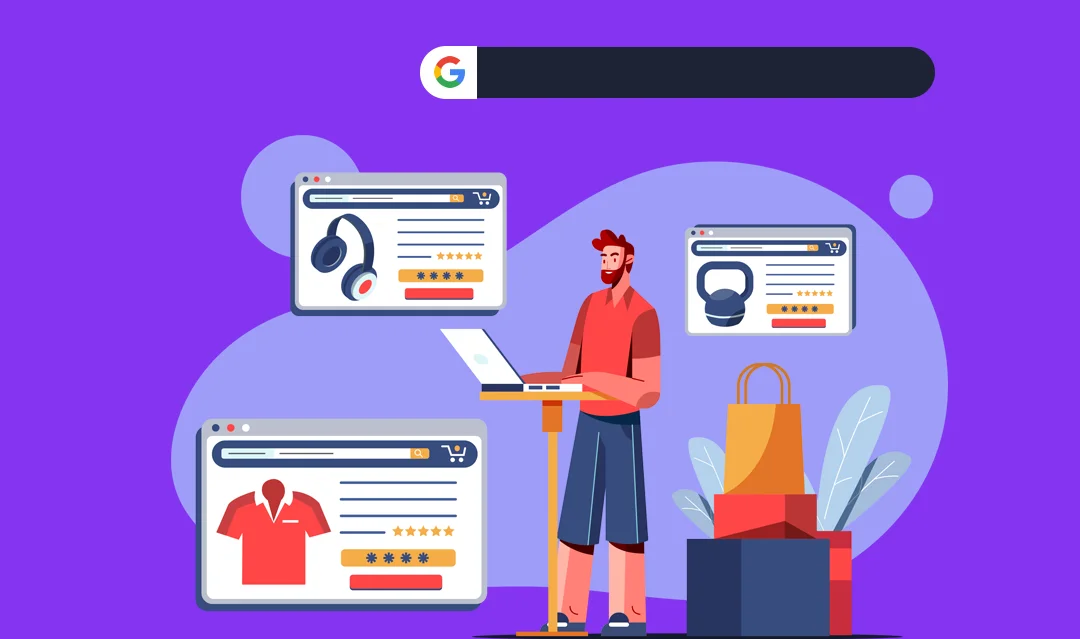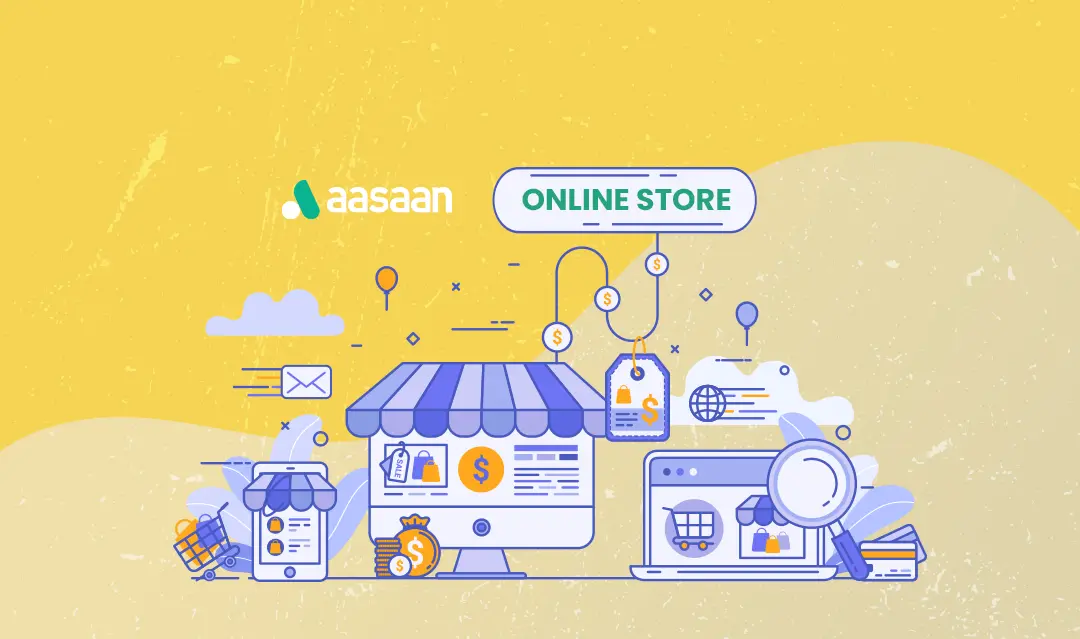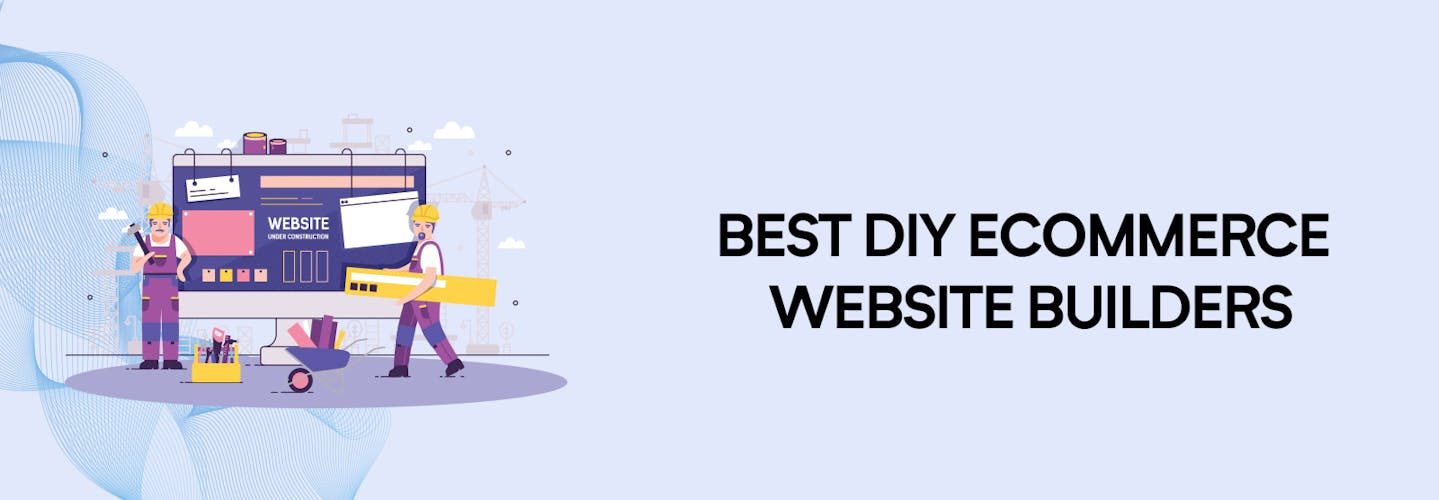
6 Best DIY Ecommerce Website Builders for Online Success in 2025
Are you an entrepreneur or small business owner looking to launch an online store?
Having a high-quality ecommerce website is essential for success in the digital age.
But building an ecommerce site from scratch can be daunting, especially if you have limited technical skills or budget.
That’s where DIY ecommerce website builders come in - they allow you to create your own website with little to no coding knowledge and at a fraction of the cost of hiring a professional web developer.
But with so many Drag and drop ecommerce website builders on the market, how do you know which one is right for your business needs?
In this article, we’ll break down the top 6 best options available in the market.
We’ll also dive into tips for building a successful online store with the help of these platforms. Before diving into picks.
Having a high-quality ecommerce site is crucial for businesses today because more consumers are shopping online than ever before.
Global ecommerce sales are expected to reach a total of $6.3 trillion worldwide in the year 2023.
In addition to reaching more customers through digital channels, having an ecommerce site also allows you to expand your reach beyond local markets and operate 24/7 without physical store limitations.
So whether you’re starting from scratch or looking to upgrade your existing site with better functionality or design features- choosing the right DIY ecommerce builder can offer valuable solutions for growing your business online.
Brief overview of what an ecommerce website builder is
So, let’s start off with the basics. What is an ecommerce website builder?
Essentially, it is a tool or platform that allows you to create an online store and manage your business operations from one central location.
These builders are designed for small businesses and entrepreneurs who want to create their own online presence without the need for extensive coding knowledge or web development experience.
With an ecommerce website builder, you can choose from a variety of templates and designs to create a professional-looking site that showcases your brand and products.
These builders typically offer drag-and-drop functionality, which means you can easily add elements like images, text, and buttons with just a few clicks.
Moreover, these website builders often come equipped with features such as integrated payment gateways, inventory management tools, shipping options, and marketing integrations.
This means you can sell products online without worrying about the technical details of setting up an ecommerce store from scratch.
You’ll have everything you need in one place to get started selling your products or services right away.
Overall, an ecommerce website builder provides businesses with the ability to create a fully-functional online store quickly and easily without hiring expensive developers or designers.
It’s perfect for those who want to get started in ecommerce but don’t have any experience setting up websites themselves.
With minimal effort and cost involved in getting started on these platforms, there’s no reason not to give it a try!
Importance of having a high-quality site for online businesses
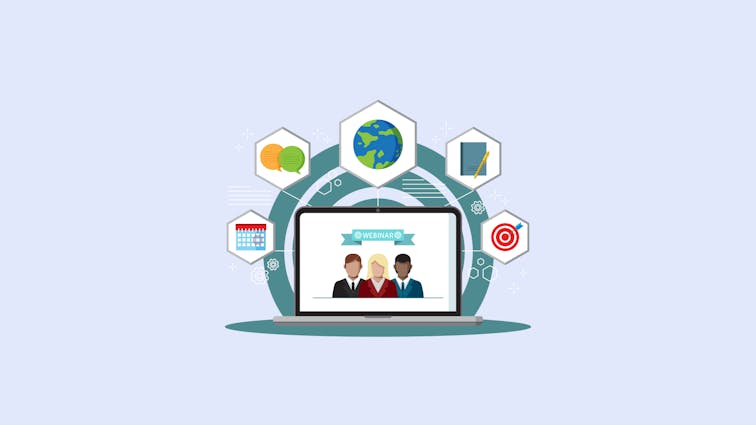
Online businesses have become increasingly popular in recent years, and having a high-quality website is crucial to their success.
Your website is often the first impression that potential customers have of your business, so it’s important to make sure that it looks professional and trustworthy.
A poorly designed website can deter customers from making a purchase or even visiting your site in the first place.
A high-quality website also helps to build trust with your customers.
When people visit your site, they want to know that they are dealing with a reputable business.
A professional-looking website gives them confidence that you are a legitimate business and can be trusted with their personal information and payment details.
In addition to building trust, a high-quality website can also help to improve customer satisfaction.
If your site is easy to navigate and provides all of the information that customers need about your products or services, they are more likely to have a positive experience shopping with you.
This can lead to repeat business and recommendations to friends and family members who may also be interested in what you have to offer.
Overall, investing time and resources into creating a high-quality ecommerce website can pay off in big ways for online businesses looking for long-term success.
The benefits of DIY website builders for small businesses and entrepreneurs
DIY website builders offer numerous benefits to small businesses and entrepreneurs, making them a viable and cost-effective option for creating professional ecommerce websites. Some of these advantages include:
- Cost savings: It saves you money by eliminating the need to hire expensive web developers or designers. They charge a more affordable monthly or annual fee compared to project-based professional hiring.
- Ease of use: DIY ecommerce website builders have intuitive, drag-and-drop interfaces, making it easy for non-technical users to create stunning online stores. No coding or extensive design skills required.
- Customizability: It offer customizable templates and design features, allowing you to create a unique, fully-branded website tailored to your business needs. Easily adjust colors, fonts, and layouts to match your brand and showcase products effectively.
- Scalability: It support easy growth for your online store. Add products, categories, and features without redesigning the entire site or seeking additional development support.
- Faster setup time: With DIY website builders, your ecommerce store can be up and running within hours or days, depending on your familiarity with the platform. Start selling and generating revenue quickly, avoiding the time-consuming process of building a site from scratch or relying on external developers.
- Integrated tools and features: Many DIY ecommerce website builders include integrated tools like payment gateways, inventory management, shipping options, and marketing tools. Manage all aspects of your online store in one place, saving time and streamlining operations.
- Regular updates and support: DIY website builders provide regular updates to keep your site current with web design trends and best practices. Dedicated customer support is also available to assist with any issues that may arise, ensuring you’re never left struggling to resolve problems alone.
Top 6 DIY Ecommerce Website Builders
1. Aasaan:
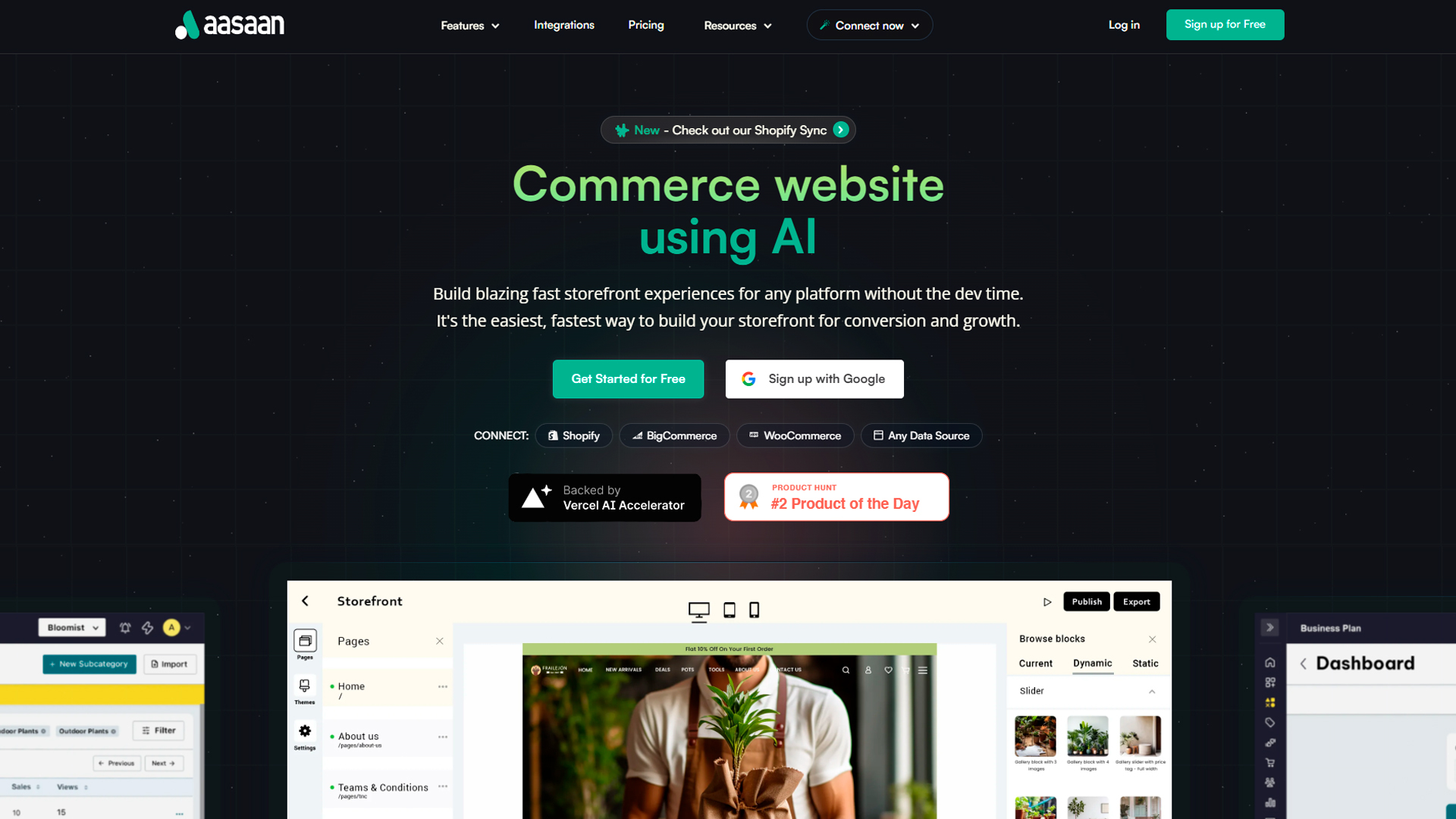
Aasaan is a no-code SaaS platform designed for SMEs to build storefronts and mobile apps using a template-driven front-end.
It allows businesses to visually build next-generation shopping experiences without any coding.
Aasaan seamlessly integrates with your existing backend or starts with its API-first commerce platform, enabling you to create rich, dynamic shopping experiences.
Pros of Aasaan
- Ease of Use: Aasaan offers a no-code platform, making it easy for anyone to set up an online store or mobile app.
- Speed: Aasaan promises a 70% increase in site speed, ensuring a seamless shopping experience.
- Conversion Rates: Aasaan claims to help businesses witness a remarkable 38% uplift in conversion rates, maximizing sales potential.
- Integration: Aasaan seamlessly integrates with your existing backend or starts with its API-first commerce platform.
Cons of Aasaan
- Free plan include branding
- Don’t have feature of B2b
Standout Features
- Drag & Drop Builder: Aasaan offers a drag and drop builder that allows you to create bespoke experiences from scratch.
- Single Admin App: With Aasaan, you can manage all aspects of your business from a single admin app, streamlining your operations.
- Seamless Integrations: Aasaan allows you to expand the capabilities of your store with tools you love and boost your business growth.
Pricing and Plans
- Standard plan: For anyone to get started quickly. It costs $18 per month if billed annually or $25 per month if billed monthly.
- Premium plan: For merchants and startups to help grow business with branding. It costs $50 per month if billed annually or $65 per month if billed monthly.
- Business plan: Enables advanced merchants with advanced features. It costs $165 per month if billed annually or $200 per month if billed monthly.
- Enterprise plan: Unlimited scalability, greater control, and dedicated resources for D2C brands to scale. It requires you to contact sales for a custom quote.
2. Shopify

Shopify is a global commerce platform that allows businesses to sell online, offline, and everywhere in between.
It is chosen by millions of entrepreneurs worldwide to build their businesses, from startups to IPOs.
Shopify is represented in over 170 countries and accounts for 10% of total US ecommerce, contributing to over $444 billion USD in global economic activity.
Pros of Shopify
- Ease of Use: Shopify provides a user-friendly interface that makes it easy for anyone, even without technical skills, to set up an online store.
- Versatility: Shopify allows you to sell online, in person, and around the world with the marketing tools, social integrations, and sales channels you need to get your products in front of customers.
- Built-in Marketing Tools: Shopify offers SEO, social media, and content marketing tools that help you reach customers where they are.
- Centralized Business Operations: Shopify allows you to manage inventory, track payments, and view real-time business insights — all in one place, so you can focus on building your business.
Cons of Shopify
- Pricing: While Shopify offers a free trial, the cost of its plans may be a con for some businesses, especially small ones or those just starting out.
- Customization Limitations: While Shopify offers a lot of customization options, there may be some limitations compared to building a website from scratch.
Standout Features
- Shop Pay: Shopify offers Shop Pay, a one-click checkout system that’s built to convert, providing a fast and reliable checkout experience.
- Point of Sale System: Shopify provides a flexible POS system that allows customers to shop their way, from online to checkout line.
- Community and Support: Shopify has a vibrant community of brands, partners, and merchants, along with a dedicated helpdesk full of articles and videos from their Support team.
Pricing and Plans
Shopify’s pricing starts at $29/month for the Basic Shopify plan. The Shopify plan is $79/month, and the Advanced Shopify plan is $299/month. Each tier offers additional features.
3. Wix eCommerce
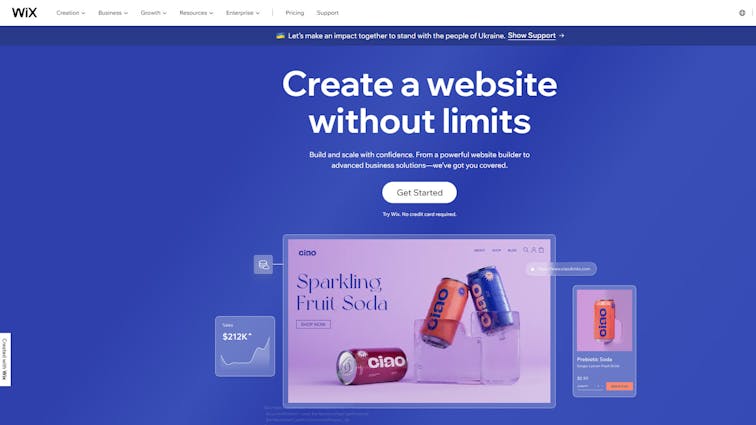
Wix eCommerce is an all-in-one eCommerce platform that allows you to create a fully customizable eCommerce website.
It enables you to sell online through your website, social media, and various sales channels, or in-person with Point of Sale (POS).
You can manage shipping, payments, marketing, and more from a unified dashboard. Wix eCommerce is designed to adapt with your business at every stage, from starting out to selling internationally.
Pros of Wix eCommerce
- Ease of Use: Wix is a no-code website builder, so you don’t need to be a designer or developer to build an eCommerce business on the platform.
- Versatility: Wix allows you to sell on multiple channels, including your eCommerce website, social media, and other leading marketplaces.
- Built-in Marketing Tools: Wix offers customizable SEO tools, a complete marketing suite, and AI-led Facebook Ads to grow organic traffic and build relationships with customers.
- Centralized Business Operations: Wix allows you to manage multichannel sales, marketing campaigns, and shipping integrations from one dashboard.
Cons of Wix eCommerce
- Pricing: While Wix offers a free version, the cost of its premium plans may be a con for some businesses, especially small ones or those just starting out.
- Customization Limitations: While Wix offers a lot of customization options, there may be some limitations compared to building a website from scratch.
Standout Features
- Wix POS Solution: Wix provides a POS solution that syncs your online and in-person sales, payments, and inventory automatically.
- Dropshipping and Print on Demand: Wix allows you to increase your product offering instantly and grow your revenue without the hassle of managing inventory, fulfillment, or shipping.
- Security: Wix provides enterprise-grade security with threat prevention and real-time detection, coupled with PCI DSS Level 1 compliance for maximum protection.
Pricing and Plans
Wix offers several pricing plans for its ecommerce platform, starting from $23/month for the Business Basic plan to $500/month for the Enterprise plan.
4. Weebly eCommerce
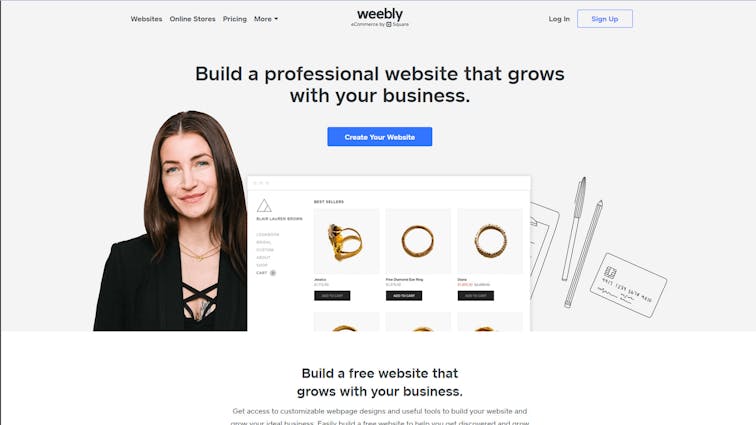
Weebly is a website building platform that also offers eCommerce solutions. It allows users to create professional websites that can grow with their businesses.
Weebly provides access to customizable webpage designs and useful tools to build a website and grow a business.
It offers all-in-one powerful eCommerce tools to simplify order management, shipping, and payments.
Weebly is now a part of the Square product suite, which means it integrates with Square’s payment processing capabilities.
Pros of Weebly eCommerce
- Ease of Use: Weebly offers a user-friendly interface that makes it easy for anyone to set up an online store.
- Integration with Square: Weebly’s integration with Square allows for seamless payment processing, making it easier to manage sales.
- Marketing Tools: Weebly provides integrated marketing tools, from Facebook ads to automated email campaigns, to help find new customers.
- Customer Support: Weebly offers support through email, chat, and phone, providing assistance for any tech hurdles that may arise.
Cons of Weebly eCommerce
- Limited Customization: While Weebly offers a range of templates, the customization options might be limited compared to other platforms.
- Limited Advanced Features: Weebly may lack some of the advanced features that other more specialized eCommerce platforms offer.
Standout Features
- Square Integration: The integration with Square allows businesses to never miss a sale and lets customers pay how they want to.
- Marketing Tools: Weebly’s integrated marketing tools can help businesses reach a wider audience and grow their customer base.
Pricing and Plans
- Free plan: $0/month
- Personal plan: $13/month, or $10/month billed annually
- Professional plan: $16/month, or $12/month billed annually
- Performance plan: $29/month, or $26/month billed annually
5. Ecwid
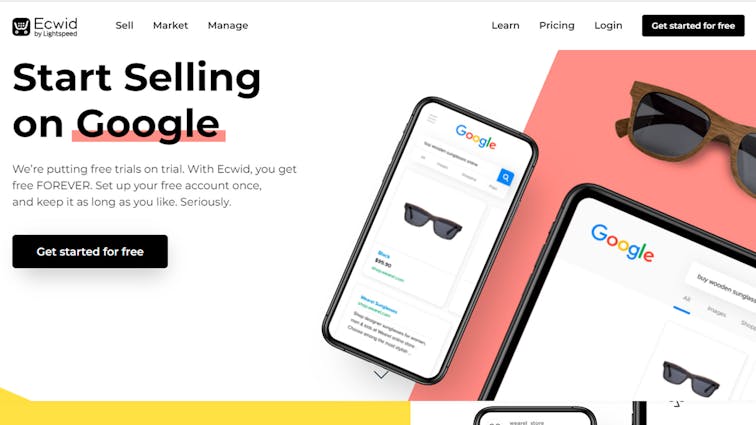
Ecwid is a powerful eCommerce platform that allows you to sell anything, anywhere, to anyone.
It provides a centralized platform for inventory, order management, and pricing. Ecwid is designed to be easy to use, allowing you to sell products, services, digital goods, and subscriptions without the need for coding or designers.
It offers the ability to sell across multiple channels, including websites, social media platforms, online marketplaces, and physical retail locations.
Pros of Ecwid
- Ease of Use: Ecwid is designed to be user-friendly, allowing you to set up an online store without the need for coding or design skills.
- Multichannel Selling: Ecwid allows you to sell on multiple channels, including your own website, social media platforms, and online marketplaces like Amazon, eBay, and Google Shopping.
- Integrated Marketing Tools: Ecwid offers integrated marketing tools, including automated Google and Facebook ads, TikTok, Pinterest and Snapchat Pixel integrations, and automated abandoned cart emails.
- Mobile Management: Ecwid offers a mobile app for iOS and Android, allowing you to manage your business on the go.
Cons of Ecwid
- Limited Customization: While Ecwid offers a range of templates, the customization options might be limited compared to other platforms.
- Pricing: While Ecwid offers a free version, the cost of its premium plans may be a con for some businesses, especially small ones or those just starting out.
Standout Features
- Automated Marketing Tools: Ecwid’s automated marketing tools, including Google and Facebook ads, can help businesses reach a wider audience and grow their customer base.
- Mobile App: Eccwid’s mobile app allows you to manage your business on the go, making it easier to keep track of orders and inventory.
Pricing and Plans
Ecwid’s pricing plans are as follows: $15/month for the Venture plan, $35/month for the Business plan, and $99/month for the Unlimited plan
6. BigCommerce
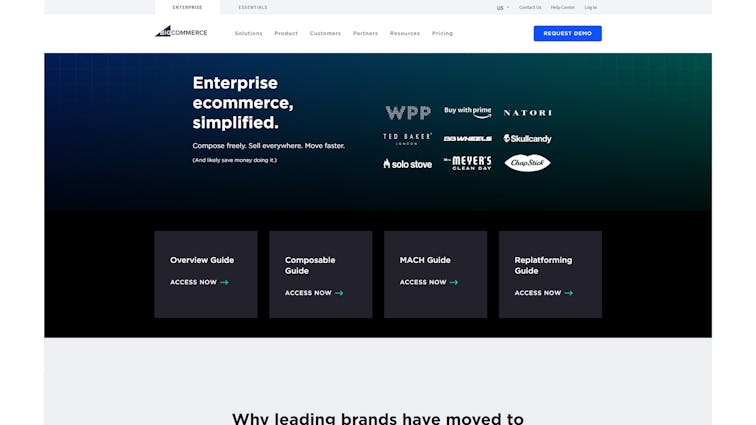
BigCommerce is a leading eCommerce platform that provides businesses with enterprise eCommerce capabilities at a lower cost and complexity.
It is designed to fit your business, offering a modern SaaS platform that combines the best of SaaS and API-enabled openness and flexibility.
BigCommerce provides enterprise integrations and tools you need to customize faster, offering scalability for the global shift to online purchasing.
Pros of BigCommerce
- Flexibility and Scalability: BigCommerce offers a flexible and scalable platform that can handle the global shift to online purchasing.
- Open SaaS Solution: BigCommerce’s Open SaaS solution combines the benefits of SaaS with the flexibility of API-enabled openness, allowing for extensive customization.
- Multichannel Selling: BigCommerce allows you to sell on multiple channels, including your own website, social media platforms, and online marketplaces.
- Integrated Marketing Tools: BigCommerce offers integrated marketing tools, including SEO tools, to help businesses reach a wider audience and grow their customer base.
Cons of BigCommerce
- Pricing: While BigCommerce offers a robust set of features, the cost of its plans may be a con for some businesses, especially small ones or those just starting out.
- Complexity: BigCommerce offers a lot of advanced features, which might be overwhelming for beginners or small businesses that need simpler solutions.
Standout Features
- Open SaaS: BigCommerce’s Open SaaS platform allows businesses to optimize their eCommerce approach to their specific needs.
- Robust Security: BigCommerce offers robust security, including ISO/IEC 27001:2013 and PCI DSS 3.2, Level 1 certification.
- Composable Architecture: BigCommerce offers a composable architecture and headless commerce integrations, providing businesses with the flexibility to build a custom eCommerce solution.
Pricing and Plans
Big commerce Offers four pricing tiers: Standard ($29.95/month), Plus ($79.95/month), Pro ($299.95/month), and Enterprise (custom pricing).
Additional charges may apply for certain app integrations, premium account services, and increased sales volumes, depending on the chosen plan.
Tips for Building a Successful Ecommerce Site
1. Choose the Right Platform:
Select an eCommerce platform that best suits your business needs, budget, and technical expertise. Consider factors such as ease of use, customization options, scalability, and marketing tools when making your decision.
2. Responsive Design:
Ensure your eCommerce website has a responsive design, which automatically adjusts to provide an optimal viewing experience on various devices and screen sizes. This is crucial for providing a positive user experience and reaching a wider audience.
3. High-Quality Product Photos:
Invest in high-quality product photos that showcase your products effectively. Visuals play a significant role in building confidence in potential buyers, and high-quality images can contribute to an increase in conversion rates.
4. Detailed Product Descriptions:
Create detailed, accurate, and engaging product descriptions that provide all the necessary information customers need to make an informed decision. Make sure to highlight product features, benefits, and specifications, while maintaining a clear and easy-to-read format.
5. Intuitive Navigation:
Organize your eCommerce site with logical categories and intuitive navigation, making it easier for customers to find what they’re looking for quickly. This helps improve user experience and increase the likelihood of conversions.
6. Fast Site Loading Times:
Optimize your website for fast loading times, as slow load times can negatively impact both user experience and search engine rankings. Use techniques like image compression, browser caching, and code optimization to ensure improvements in site loading speeds.
7. Secure Transactions:
Ensure your eCommerce site offers secure transactions by using SSL certificates and up-to-date payment gateways, protecting both your business and your customers’ sensitive information. This builds trust with your potential buyers and minimizes the risk of data breaches.
8. Easy Checkout Process:
Simplify the checkout process and minimize the steps required for customers to complete their purchase. An overly complicated or confusing checkout process can lead to abandoned carts and lost sales.
9. Customer Support:
Provide exceptional customer support through various channels such as email, live chat, phone, or social media. Being responsive and helpful to customers’ inquiries and concerns can significantly boost customer satisfaction and loyalty.
10. Optimize for SEO:
Implement strong search engine optimization (SEO) strategies to improve your website’s visibility on search engine results pages (SERPs). This includes using targeted keywords in your content, meta tags, and image descriptions, as well as engaging in high-quality link-building and maintaining a clean, streamlined website structure.
11. Monitor Analytics and Performance:
Regularly track and analyze your eCommerce site’s performance data using tools like Google Analytics or specialized eCommerce analytics software. By monitoring your site’s performance, you can identify areas to improve upon and make data-driven decisions to further optimize your online store.
Conclusion:
In conclusion, building a successful eCommerce site requires a careful balance of various factors, such as choosing the right platform, implementing responsive design, and focusing on exceptional customer support.
Equipped with these tips, businesses can create an optimal online shopping experience for customers while maximizing their potential reach and sales.
Continual optimization and monitoring of site performance will further enhance the potential success of your eCommerce endeavor.
By following these guidelines, businesses can stand out in the increasingly competitive online marketplace and achieve lasting eCommerce success.
FAQ’s:
1. Can I build an ecommerce website on my own?
Yes, you can build an ecommerce website on your own using website builders like Aasaan, Shopify, Wix, or BigCommerce. These platforms offer templates and easy-to-use tools that don’t require coding skills, making it possible for anyone to create a professional online store.
2. What is the cheapest way to build an ecommerce website?
The cheapest way to build an ecommerce website is to use an affordable ecommerce platform like Aasaan, Wix or Shopify, which offer plans starting at $23 and $29 per month respectively. They provide all the necessary tools to start selling online, including hosting, templates, and ecommerce features.
3. How much does it cost to build an ecommerce website?
The cost of building an ecommerce website varies based on the platform you choose and your specific needs. Basic plans on platforms like Wix and Shopify start around $23 and $29 per month respectively. More advanced plans, which include additional features, can cost up to several hundred dollars per month.



